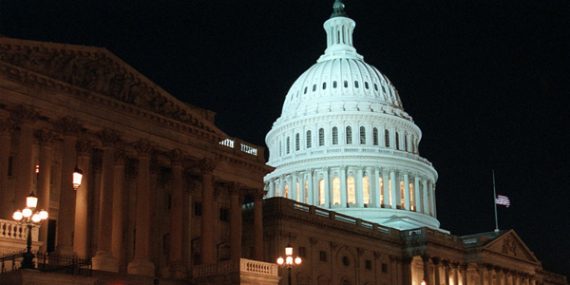Anti-Tax Orthodoxy Of House Republicans Looks Like It’s Ready To Crack
As we approach the fiscal cliff, there are signs that House Republicans may not be as rigid as they were the past two years.
With the election over, President Obama safely in the White House for another four years, and the Democrats holding a slightly expanded majority in the Senate, attention is turning to the upcoming negotiations over the impending “fiscal cliff,” and specifically the question of what to do about the Bush Tax Cuts, there are signs that Republicans are starting to waiver on their previous anti-tax orthodoxy:
Republicans might have held the House, but Grover Norquist’s majority in Congress is all but gone.
Fewer incoming members of the House and Senate have signed the pledge against tax increases run by Norquist’s Americans for Tax Reform, in a reflection not only of the seats that Democrats gained but of the success they’ve enjoyed in vilifying Norquist.
About a dozen newly elected House Republicans refused to sign the anti-tax pledge during their campaigns, and another handful of returning Republicans have disavowed their allegiance to the written commitment.
With Democrats picking up seven or eight seats, that means the pledge guides fewer than the 218 members needed for a majority. In the Senate, where Republicans lost two seats, just 39 members of the chamber are pledge-signers, according to the group’s records. That is a drop from 238 members of the House and 41 senators who committed to the pledge at the start of the 112th Congress.
Norquist’s diminished clout could have ramifications during intensifying negotiations over the so-called “fiscal cliff” and a grand bargain on taxes, spending and entitlements that leaders in both parties want to strike in the coming months.
In the wake of President Obama’s reelection, House Speaker John Boehner (R-Ohio) has said Republicans could accept a deal that includes new revenue under certain conditions. Legislation that increases overall federal revenue could violate the pledge, which forbids its signers from supporting increases in the marginal income tax rate or the elimination of deductions and loopholes that are not offset with tax cuts elsewhere.
Some of the comments from incoming Republican freshmen who refused to sign the pledge are interesting:
“I don’t want to sign a pledge that’s going to tie my hands,” Ted Yoho, a GOP congressman-elect from Florida, told The Hill. “I need free rein to do what I think is right for the people in my district and the country.”
Yoho is no fan of taxes, calling them “a necessary evil, it appears.” He said one reason he did not sign the pledge was that he had never met Norquist. “To sign a pledge to somebody that’s not a member of Congress or part of my constituency, I don’t think would be very prudent,” Yoho said.
Susan Brooks, a newly elected Republican from Indiana, offered a similar explanation on the campaign trail, spokeswoman Dollyne Pettingill Sherman said. “She just took the position that she was not going to sign pledges,” she said. “That doesn’t mean she’s for tax increases. She’s not. She was very clear about it.”
(…)
At the height of deficit talks in 2011, Norquist faced criticism from some Republicans who said they did not feel bound by a pledge many of them took years ago when they first ran for the House. Returning Republican Reps. Mike Simpson (Idaho), Howard Coble (N.C.), Jeff Fortenberry (Neb.) and Scott Rigell (Va.), among others, all disavowed the commitment. A pledge-signer in the Senate, Tom Coburn (Okla.), also publicly battled with Norquist.
I noted on Sunday that the election results had placed Republicans in a bind on the tax issue and that they had a choice ahead of them to either stick with the Norquest view of politics or to accept the reality of their reduced bargaining position, and the seriousness of the situation we face, and make a deal that includes tax increases in some form or another. Last week, Speaker Boehner already approached that issue in his post-election press conference when he said that his party might be willing to accept revenue increases that weren’t actual increases in tax rates, which suggests an approach that limits deductions for high income earners in a manner similar to what Mitt Romney was proposing during the election. Bill Kristol went far further than Boehner on Sunday when he said that Republicans shouldn’t live or die on the issue of an increase in the marginal tax rate for wealthy people. Because of all of this the sense is building among many in Washington, that a budget deal that includes tax increases in some form may be far more politically possible than anyone had thought it could be before the election.
If the GOP does give in even an inch on this issue, it will end up being a tremendous defeat for Norquist and will likely result in an equally tremendous decline in his lobbying power on Capitol Hill. There will likely be challenges to any Republicans who vote in favor of whatever deal ends up passing in 2014, but if the plan succeeds in reducing the deficit and the economy has recovered even more, then it will be hard to unseat a Republican for a vote that took place two years in the past. Besides that, of course, there’s the fact that broad majorities of Americans, including broad majorities of Republicans, favor the idea of a budget deal that includes tax increases for the wealthiest Americans. So, one has to wonder just how damaging supporting that type of plan really would be for Republicans, especially if it turns out that the income level for the tax increases gets boosted from $250,000/year to something closer to the $1,000,000/year that Democrats like New York Senator Chuck Schumer have suggested as an alternative.
I’m no fan of taxes to be sure, and I’d prefer to not see taxes go up at all. However, we are in a serious fiscal bind in this country and we have a government that is controlled by two parties. Neither side is going to get everything they want, but they both need to come together and reach some kind of compromise that will avoid falling off the fiscal cliff. Given that stark reality, I’m not sure what’s so wrong about a deal that includes raising the marginal tax rates of people who can more than afford to pay it. Besides, politically, there really are no other options at this point unless you truly do want to jump off the cliff and, most likely, push the economy into a recession.







I’ll believe it when the actual negotiating and lobbying takes place. I also remember when it looked like McConnell was going to cave on the debt ceiling, and the Teahadists rebelled.
Smart money still says this goes past January 1.
If the U.S. were a stock I’d be short selling it.
I agree that this will go past January 1st. Obama’s leverage will increase dramatically then, so if I was him, I would just play it out. The Republicans saying they’re a bit more open to taxes is just a recognition that they are completely powerless to stop the tax increases, and getting half a loaf is better than getting no loaf at all.
@Tsar Nicholas:
You keep saying that, but you must know there are dozens of plays you can make, if you really think some other country will outperform us.
I of course believe in America and own it (as Total Market funds).
Of course, Vice President-elect Paul Ryan has informed us that the voters sent a message that President-elect Romne’s tax plan needs to get enacted, pronto:
http://abcnews.go.com/Politics/paul-ryan-exclusive-obama-lacks-mandate-voters-support/story?id=17710391
What is needed is an independent study and recommendations of full scale tax reform. One idea is a national sales tax to replace the current system of income taxes that is full of loopholes and other exceptions. A national sales tax on everything from a cupcake to a Gulfstream V jet would bring everyone in the system who buys anything: anyone who is alive would be paying unless they never buy anything. And I would not put it past this administration to even considering taxing our dead relatives! The rich would no longer have their loopholes and deferrals. Middle class would come out about the same, maybe even better. This would be a lot better than what we have now and would bring in a lot more income. Everyone has to pitch in with a sales tax plan.
This is really a tired and disengenious argument…many of those people who don’t pay income taxes (due to not making enough income, you know, the Republican idea of an earned income tax credit) pay plenty of other taxes that cause them to pitch in, like FICA as well as local and state taxes…
@Whitfield:
A national sales tax or VAT would be much more regressive than the current income tax, and would probably have to be close to 30%, which is going to be a very hard sell.
Voodoo economics lost.
A balanced approach won.
Ryan was embarrassed…didn’t even carry his own state.
Even Palin carried Alaska.
in lieu of all the rhetoric, has anyone actually added up just how much a tax increase will do to drive down the deficit? i imagine it’s minimal and not worth mentioning as nobody really is.
@bill: It depends on how the size of a tax increase. See
http://www.salon.com/2012/11/13/obamas_grand_bargain_ing_leverage/
@C. Clavin: Alaska is a much lighter load to carry, even though the state is big in size.
@Whitfield: .
That´s pretty regressive, and unless you set a flat tax it´s also possible to create loopholes for sales taxes. By the way, that´s what happens in Brazil, where most of the money comes from sales taxes. The income tax is pretty simple and easy to fill (Believe me, you download a program, fill your income, deductions – mostly medical and education expenses – and then it´s over), while almost no one understands the Sales Tax Legislation.
HAHAHAHAHAHAHAHA
Good one, Doug.
The problem is that while a majority of Republican voters might support a tax increase, the crazies are the ones that vote in the primaries. Particularly in Congress, any GOPer that votes to increase taxes will be brutalised in a primary in < 18mo.
@ bill
In other words, you are a conservative, and as such, you don’t believe in paying for the things you have already bought…
So they are worried a tax hike will hurt them in 2014? A dem running against them would really have the gall to attack them on taxes? And a GOP district that hates the prez will just flip? nonsense, just raise them already.
@Jc:
In the primaries, JC.
@bill:
Here’s a breakdown of the the president’s plan (via Kevin Drum):
Doesn’t sound minimal to me.
It’s long been obvious that if Obama won re-election he would hold all the cards in any fiscal negotiations with Republicans. Nor have he and his team, notably Lew, been given credit for the shrewdness of the deal they struck with Republicans over the debt ceiling in 2011. It took the entire subject off the table until early 2013 and locked the Republicans into an entirely predictable box on the sequestrations. In order to raise sufficient revenue top marginal rates are going to have be raised, the vague offers from Republicans on closing loopholes aren’t going to be enough to do it. Hence they are going to have agree and if they don’t they’ll be faced with expiry of the Bush cuts and Democratic legislation to reintroduce those that benefit the middle class. Then it will be onto the debt ceiling. Are Republicans going to shutdown the govt and force a default around inauguration day. It doesn’t seem very plausible. Finally Republicans are desperate to avert the sequestrations and it’s not just the defense cuts because many of the other savings are going to impact business constituencies. It’s hard to tell whether this will play out as a series of one act plays or one grand finale but fundamentally the president and Democrats are going to be largely writing the contract.
@Latino_in_Boston:
Absolutely right. Obama only has to practise masterly inactivity to win hands down. As some financial journalist said the other day when you’re the one running round offering solutions as the Republicans are (even if they are phony) then you’re losing.
I think the intellectual right has accepted that taxes must ease back up for some time, and that they fed the troops “ever lower*” as long as they could. They probably accepted that taxes would rise in any cliff/deficit solution. They probably hoped for Romney to win, and then to enjoy a “look at us, how reasonable we are” moment.
Well, Obama won, and any cliff/deficit solution still needs enhance revenues.
The fact that Democrats are not, never have been, hard-lining on “no cuts” means that they don’t get to score any points, other than by doing their part now for good governance.
* – and “class warfare”, an OTB favorite.
@Stan: that’s minimal compared to the $5 trillion rung up since obama took office.
and why is obama’s whole plan still associated with his predecessor, doesn’t he have any idea how to increase revenue or cut spending on his own? I hear they’re looking into romney’s plan to wack some loopholes in the tax code and limit deductions. but then again, none of these plans are obama’s, why is that? did you get what you voted for?
@bill:
It’s a pretty simple chronology. We had a tremendous business expansion in America, roughly from 1980 to 2000. It was probably connected with the rise of computation and communications. It overshot though at the end, in the dot com boom and bust. The Bush administration did not make that mess, but had to clean it up. They lowered interest rates, and tried a variety of stimulus. They managed to generate a few weak recoveries. The term “jobless recovery” was born in this era.
In good part because the low interest rates were kept too low too long, a new, unhealthy bubble emerged. That would be the housing one. It blew up bigger and worse than the dot com, because it affected millions of families literally where they lived. It wasn’t just a paper loss on a retirement portfolio intended for use 20 or 30 years away. Money was lost in the here and now.
So, Obama inherited a mess in two ways. There was the crash, and the fact that the economy Had Already (important) been pumped with low interest rates and stimulus.
Of course it was tough. Of course it took strong medicine. Sadly it isn’t over.
(Oh, and a couple trillion thrown away on Bush’s wars.)